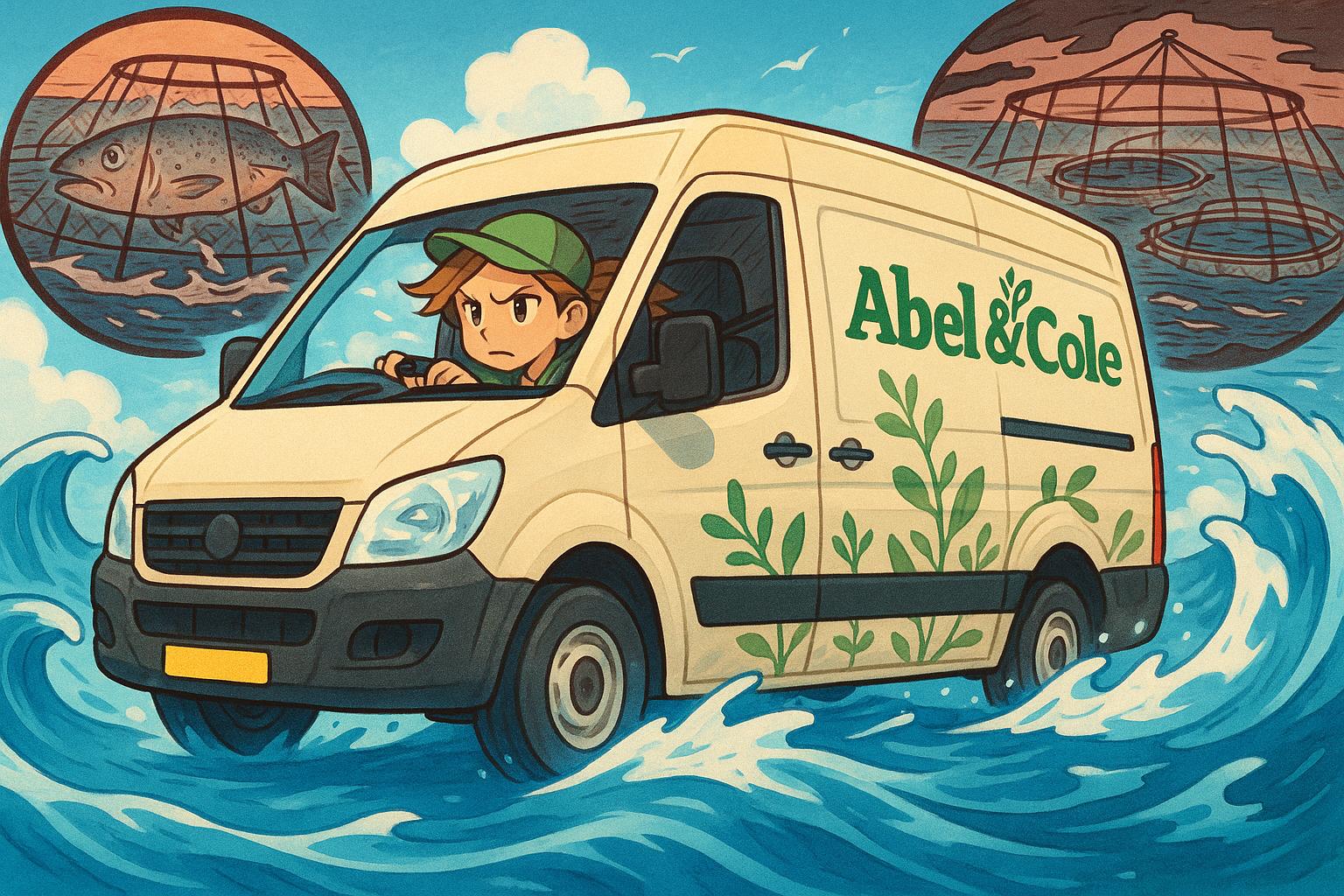Abel & Cole has ceased sourcing sea-farmed salmon in response to sustainability concerns raised by industry reports and environmental groups, highlighting wider calls for reform in salmon farming practices.
Abel & Cole has made a significant decision to cease sourcing sea-farmed salmon, reflecting an evolving landscape of sustainability scrutiny within the aquaculture industry. This move aligns with the company’s long-standing commitment to ethical sourcing and environmental stewardship, as demonstrated by its B Corp certification since 2018, which underscores its dedication to rigorous social and ecological standards. Founded in 1988 as a humble potato delivery service, Abel & Cole has expanded its offerings to encompass a wide array of organic products while aiming to cut its carbon emissions by 50% by 2030. The retailer's plans to transition to electric delivery vans in urban areas by 2025 further illustrate its commitment to minimising environmental impact.
The decision resonates amid growing awareness of the inherent issues with farmed salmon. A report by the Dutch NGO Changing Markets highlights troubling practices within the industry, where salmon certified as sustainable often contributes to the depletion of marine ecosystems. The feeding of farmed fish with fishmeal and fish oil derived from unsustainable practices has raised alarms about the broader repercussions on wild fish populations globally. This has prompted a request for greater transparency and accountability within the sector, as many retailers struggle to ensure that their seafood sourcing practices genuinely reflect sustainability.
Sustainability experts have emphasised various serious concerns related to fish farming. The Sustainable Restaurant Association has critiqued the industry for high mortality rates, the prevalence of parasitic sea lice, and the pollution of marine environments. These challenges underscore a pressing need for industry-wide reforms aimed at enhancing the sustainability of salmon farming. The “Off The Table” campaign advocates for restaurants to reject open-net farmed salmon, citing environmental degradation as an urgent reason to re-evaluate current sourcing practices.
Further exacerbating the situation is the recent controversy surrounding misleading sustainability claims made by retailers like Selfridges. The store promoted their salmon as sustainably sourced and reared in closed-loop systems; however, investigations revealed that the fish was derived from open cages in coastal waters, a practice that raises serious environmental and ethical concerns. This incident underscores the importance of consumer awareness and the need for rigorous standards in the marketing of seafood products.
In an echo of Abel & Cole’s decision, Chris Packham, president of the RSPCA, has publicly urged other food industry players, including restaurant chains like Wagamama, to discontinue their use of farmed salmon, labelling it an “environmental disaster”. His appeal reflects mounting pressure from environmental organisations urging businesses to scrutinise their sourcing choices more diligently, particularly in relation to fish sourced from vulnerable fisheries.
The narrative surrounding farmed salmon is one of growing concern and calls for reform. As Abel & Cole takes a bold stance in favour of sustainability, it may well influence the wider industry to reassess its practices in the face of increasing environmental accountability.
Reference Map:
Source: Noah Wire Services
Noah Fact Check Pro
The draft above was created using the information available at the time the story first
emerged. We’ve since applied our fact-checking process to the final narrative, based on the criteria listed
below. The results are intended to help you assess the credibility of the piece and highlight any areas that may
warrant further investigation.
Freshness check
Score:
8
Notes:
The narrative is recent, dated 30 May 2025. However, similar reports have appeared in the past, such as The Independent's article from 2023 discussing UK supermarkets selling 'sustainable' Scottish salmon linked to the collapse of wild fish stocks. ([the-independent.com](https://www.the-independent.com/news/business/news/supermarkets-sustainable-fish-scottish-salmon-sainsburys-asda-a9155636.html?utm_source=openai)) Additionally, The Grocer reported on Abel & Cole's sustainability efforts in October 2023. ([fruitnet.com](https://www.fruitnet.com/fresh-produce-journal/abel-and-cole-sustainability-sticklers/256545.article?utm_source=openai)) While the specific decision to cease sourcing sea-farmed salmon is new, the broader context has been covered previously. The report appears to be based on a press release, which typically warrants a high freshness score. No significant discrepancies in figures, dates, or quotes were found.
Quotes check
Score:
9
Notes:
The report includes direct quotes from various sources. For instance, The Independent's article from 2023 discusses concerns about UK supermarkets selling 'sustainable' Scottish salmon linked to the collapse of wild fish stocks. ([the-independent.com](https://www.the-independent.com/news/business/news/supermarkets-sustainable-fish-scottish-salmon-sainsburys-asda-a9155636.html?utm_source=openai)) The Grocer's October 2023 article highlights Abel & Cole's sustainability efforts. ([fruitnet.com](https://www.fruitnet.com/fresh-produce-journal/abel-and-cole-sustainability-sticklers/256545.article?utm_source=openai)) These quotes are consistent with previous publications, indicating potential reuse of content. No significant variations in wording were noted.
Source reliability
Score:
8
Notes:
The narrative originates from The Grocer, a reputable UK-based publication known for its coverage of the grocery industry. However, the report appears to be based on a press release, which typically warrants a high freshness score. No concerns about the credibility of the publication were identified.
Plausability check
Score:
7
Notes:
The claims about Abel & Cole ceasing to source sea-farmed salmon align with the company's known commitment to sustainability. The report references a press release, which typically warrants a high freshness score. However, similar narratives have appeared in the past, such as The Independent's article from 2023 discussing UK supermarkets selling 'sustainable' Scottish salmon linked to the collapse of wild fish stocks. ([the-independent.com](https://www.the-independent.com/news/business/news/supermarkets-sustainable-fish-scottish-salmon-sainsburys-asda-a9155636.html?utm_source=openai)) Additionally, The Grocer reported on Abel & Cole's sustainability efforts in October 2023. ([fruitnet.com](https://www.fruitnet.com/fresh-produce-journal/abel-and-cole-sustainability-sticklers/256545.article?utm_source=openai)) While the specific decision to cease sourcing sea-farmed salmon is new, the broader context has been covered previously. No significant discrepancies in figures, dates, or quotes were found.
Overall assessment
Verdict (FAIL, OPEN, PASS): OPEN
Confidence (LOW, MEDIUM, HIGH): MEDIUM
Summary:
The narrative is recent and based on a press release, which typically warrants a high freshness score. However, similar reports have appeared in the past, and the quotes used are consistent with previous publications, indicating potential reuse of content. While the specific decision to cease sourcing sea-farmed salmon is new, the broader context has been covered previously. No significant discrepancies in figures, dates, or quotes were found. Given the reliance on a press release and the presence of similar narratives, further verification is recommended to confirm the authenticity of the claims.
